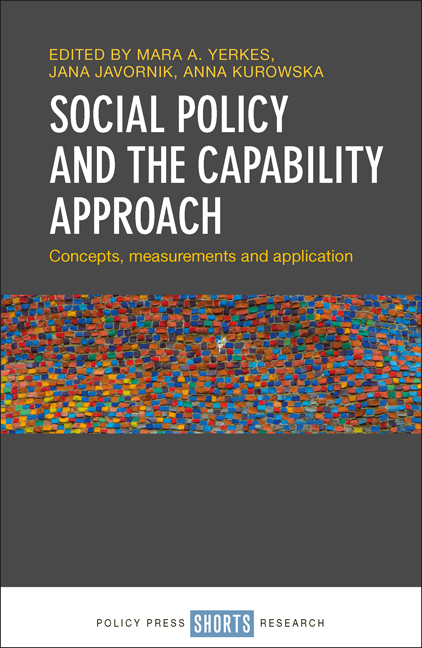Book contents
- Frontmatter
- Contents
- List of figures and tables
- Notes on the editors
- Notes on contributors
- one Rethinking social policy from a capability perspective
- two Education as investment? A comparison of the capability and social investment approaches to education policy
- three From ‘active’ to ‘capable’: a capability framework for policy and practice on ageing and later life
- four Converting shared parental leave into shared parenting: the role of employers and use of litigation by employees in the UK
- five Comparative social policy analysis of parental leave policies through the lens of the capability approach
- six Ask rather than assume: the capability approach in the practitioner setting
- seven Social investment, human rights and capabilities in practice: the case study of family homelessness in Dublin
- eight From the capability approach to capability-based social policy
- Index
eight - From the capability approach to capability-based social policy
Published online by Cambridge University Press: 30 April 2022
- Frontmatter
- Contents
- List of figures and tables
- Notes on the editors
- Notes on contributors
- one Rethinking social policy from a capability perspective
- two Education as investment? A comparison of the capability and social investment approaches to education policy
- three From ‘active’ to ‘capable’: a capability framework for policy and practice on ageing and later life
- four Converting shared parental leave into shared parenting: the role of employers and use of litigation by employees in the UK
- five Comparative social policy analysis of parental leave policies through the lens of the capability approach
- six Ask rather than assume: the capability approach in the practitioner setting
- seven Social investment, human rights and capabilities in practice: the case study of family homelessness in Dublin
- eight From the capability approach to capability-based social policy
- Index
Summary
Introduction
Social policy as a multi-layered research field spans numerous domains, each with their inherent complexities and approaches. Taking policy domains as an evaluative entry point, social policy research seeks to understand their development, processes, aims, implementation and impact from multiple perspectives and actors, including policymakers, professionals and practitioners and policy recipients. The capability approach (CA) offers a promising way forward in understanding these multiple perspectives as demonstrated by the diverse chapters in this volume. We break systematically from the established scholarship in our aim to offer new frameworks for analysing and formulating policies. We propose the use of a CA to social policy (see Chapter One), further specified into capability theories (Robeyns, 2017), as illustrated by the conceptual and methodological developments in this volume. While the combined use of a CA to social policy and domain-specific capabilities theories provides evaluative space for understanding social policy development, implementation and effects, it leaves unanswered a crucial question: to what extent can social policies at a collective level be developed from a capability perspective? In other words, how do we make the shift from a CA to social policy and capabilities theories, to capability-based social policies? In this final, concluding chapter, we briefly summarise the key arguments of the book to provide a foundation for answering this question.
As outlined in Chapter One, key to using the CA in social policy research is first and foremost to recognise social policy primarily as a resource (means) that can enhance the capabilities of individuals to live the life they have reason to value. If social policy is understood to be an interdependent set of measures and instruments aiming to change human behaviour and/or improve quality of life and wellbeing, then seeing policy as a means entails evaluating this set of resources in relation to how individuals can use them within their ecological, economic and social spaces (that is, diversified contexts). As argued in Chapter One, social policy is not value-neutral, and policies must be understood within their diverse, historical and political contexts (Ginsburg, 2004) as value-laden and based on culturallyinformed, dominant ideas (Béland, 2005; 2016) of human behaviour. The CA to social policy, as outlined in Chapter One, allows researchers to identify the normative reference points of social policies and to evaluate how policy is intended to help individuals achieve that normative reference point. Two examples were provided in Chapters Two and Three.
- Type
- Chapter
- Information
- Social Policy and the Capability ApproachConcepts, Measurements and Application, pp. 147 - 156Publisher: Bristol University PressPrint publication year: 2019

